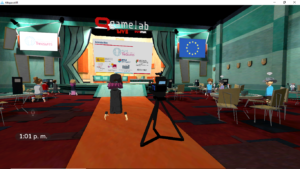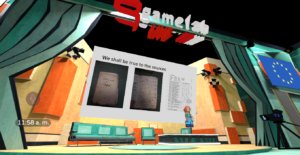Background
Video games have a serious impact on society and are globally recognised as a great tool to protect and enhance heritage, such as the hidden one from historical archives, and are a beneficial tool for education purposes. The keyword is edutainment.
Video games are often built around existing knowledge, discoveries and history (quiz, simulations, citizen science, etc.), and the archives are depositories of such kind of knowledge. But until now, no relation has been built between these two subsectors of the Cultural and Creative Industries.
Innovation – Archives and Video Games Virtual Meeting

This is where our project has brought significant innovation to archives: On April 22nd 2021, under the umbrella of our associate partner Gamelab’s flagship event (an international fair specialised on the video game industry that welcomes over 1000 attendees and 500 companies and organisations yearly in Barcelona), the project hosted a virtual reality meeting to analyse cross-sectorial hybridisation and co-production opportunities between the 2 subsectors (Archives & Video games).
You can watch the video of the event here.
The event, held on the AltspaceVR platform, facilitated the encounter of 21 professionals from the archival world and 6 experts from the video game sector:
The meeting featured two public presentations:
“Connecting EU citizens and digital natives with historical archives through contemporary digital experiences.” Paul Kenneally, Creative Digital Media Designer & Research Assistant at Munster Technological University.
You can watch the presentation here.
“How games can bring archives to life.” Ragnhild Hutchison, Managing director, Tidvis.
You can watch the presentation here.
Conclusions of the meeting by the archival experts:

The European archives are a trustworthy and authentic source of materials that are ideal for recreating environments in video games. The archives keep a great treasure of maps, drawings, plans, photographs, engravings, among others, from the Middle Ages to the present day, which could serve as a basis to recreate historical settings in an authentic way, without resorting exclusively to the design of fictional spaces.
Due to the authenticity and uniqueness of archival documents, their inclusion in video games could represent a seal of quality or a way to position them in a range that goes beyond mere entertainment, adding a prestigious brand.
The stories behind the documents in the archives, lived by the people who preceded us in other times of the past, are worth telling and are objects of the best novels, series or, why not, video games. The stories behind the documents are worth diving into. Among these forgotten documents are the best stories about spies, witches, Knights Templar, naval battles, geographical discoveries, family sagas, betrayals, revenge … Everything you can imagine has already been lived and is in the archives.
The archives seek to approach audiences that traditionally do not know their value, such as the young public and what better way to approach them than through the collective culture of video games, in such a way that the playful component can be combined with the learning.
Videogames experts said after the meeting that:
Historical archives could be a good resource for game creators. Archives are all about stories, stories about people and about places and their connections and relationship with time.
So many games do the same thing. Archives are a vast resource that should be used to tell new stories or to inspire different ones. This will help archives get their content out to a wider audience and will give games studios new material with which to create narratives.
Creators also said that they would advise the archives to ease the access to their information. They believe that a people’s history should be made available to all as Open Access. This can be done of course through online databases and searching tools provided by archives, but could also take advantage of relationships with commercial and indie games developers, an exchange of funding, credit, intellectual labor, and visibility.
They think archives could also benefit from working with game companies in making European History more widely known.
REINHARD: Yes! I think to start, small projects are best. These can be done as less-expensive projects focusing on one or two stories/themes.
If successful, useful, accessible, and sustainable, more projects can follow year-to-year. Make games an introduction to this archival material, turning some players into visitors, researchers, and hopefully donors.
What are the main learnings you get from the meetings you had yesterday?
REINHARD: As I put on Twitter:
1) archivists at the national level in Europe are taking games seriously as a way of telling history-/document-driven stories, using small games as a gateway to Linked Open Data.
2) High-level reps. from the games industry are listening to—and at times partnering with—cultural heritage institutions to mine content for digital interactive entertainment, creating an ecosystem of content-driven narratives while making new audiences for heritage orgs. Win-win!

